The idea and implementation of this event belongs entirely to the first Marketing Department in Russia, which celebrates its 30 anniversary in 2019, and now plaguing the leading role in marketing education and applied research in Russia.
The global outbreak means that almost 4 billion people in the world have been suddenly forced to stop their business and human activities. Almost all enterprises, transport, opportunities for movement between cities and countries have been stopped, which has led to the breakdown (or shutdown) of economic ties.
A globalization which has been talked about so much during the last two decades and have been admitted as a natural development processes of the economies of different countries developing their cooperative relations and international trade along with the destruction of the cultural and social identity of some regions and countries, have almost been suspended by the decisions of Governments.
The pandemic of COVID-19 suddenly have made an unusually strong impact on different business types and forms, put the development of contacts on hold and made the strongest impact on changing consumer behavior patterns. Along with the unfavorable economic situation of falling oil prices, depreciation of the ruble to the main currencies, suddenly almost all business activity of companies and education have been stopped.
As scientists and marketing teachers, we have also faced the need to adapt quickly to the current challenges of the complete transition to distance learning as well as to change all our materials of almost all courses not only to adjust to the online formats and platforms, which are used to keep contact with our students but what is most important, we have to (however, as it used to happen in other periods of crises) take into account, analyze and process all incoming information about changes in the business patterns and consumer behavior and incorporate them into our materials to initiate discussions with our students.
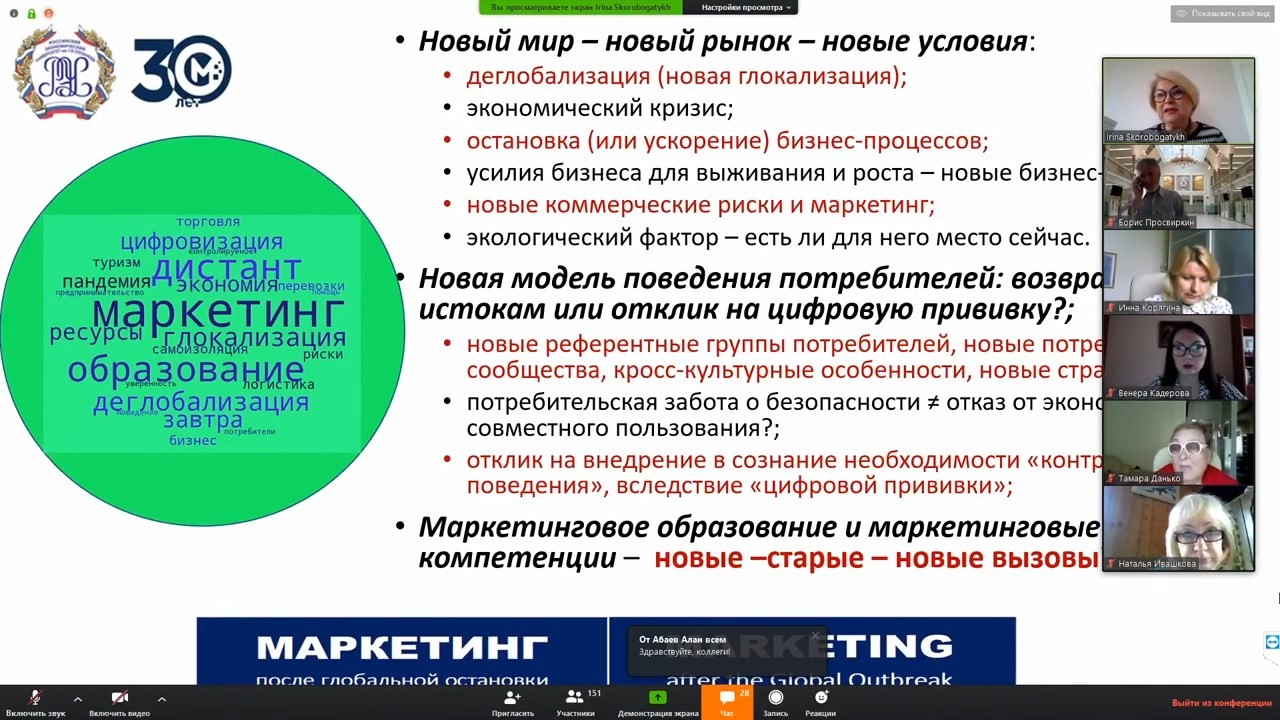 It should be specified that we as members of the first Department of Marketing constantly feel the bit of modern trends occurring in the external business environment and discuss them within our professional circle or with the customers of our scientific and applied marketing researches. However the current situation seems so obvious to us that our internal discussions have been not enough. So we decided to initiate a round table that would bring together different scientists, practitioners from different spheres and industries in order to understand that we should continue exchanging point of views and witness unique modern marketing practices some companies are creating and implementing, which are facing a vital choice: to develop or to die.
It should be specified that we as members of the first Department of Marketing constantly feel the bit of modern trends occurring in the external business environment and discuss them within our professional circle or with the customers of our scientific and applied marketing researches. However the current situation seems so obvious to us that our internal discussions have been not enough. So we decided to initiate a round table that would bring together different scientists, practitioners from different spheres and industries in order to understand that we should continue exchanging point of views and witness unique modern marketing practices some companies are creating and implementing, which are facing a vital choice: to develop or to die.
In general, the round table program could be divided into three major sections:
- new markets - new conditions - new business models of the companies and marketing opportunities to consider new conditions and create new values for the consumers;
- detailed analysis of the consumers, the degree of their confidence in the future, new values and new behavior in preferences and purchases of certain goods and services based on them, changing attitudes towards brands and individual product categories;
- marketing education and marketing competencies in the modern reality, what lessons we as teachers should receive and how we can change and adapt educational programs to the new conditions.
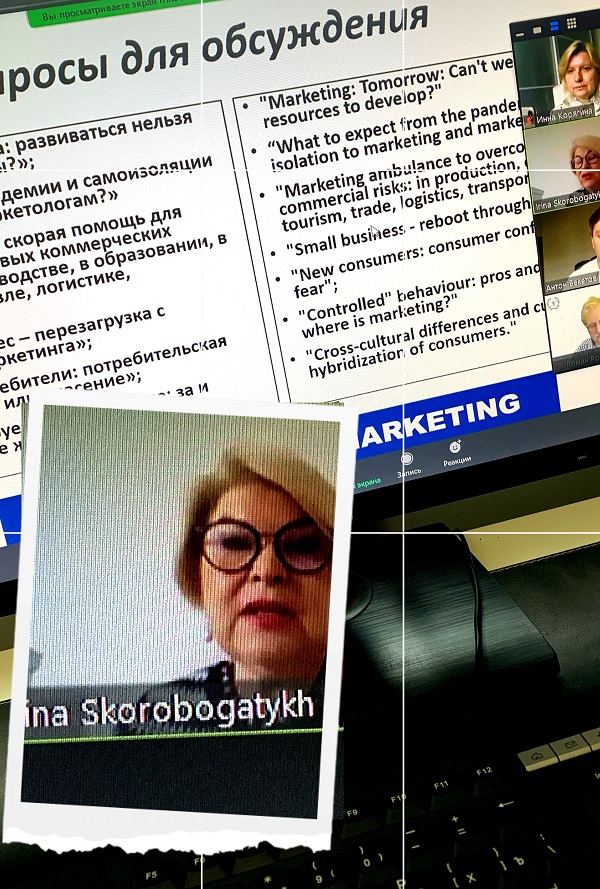 The capabilities of Zoom online platform where the event was held allowed organizing not just speeches but a real dialogue with participants, similarly to those we usually have during classic offline conferences. A special interactivity was organized by having live communication in the round table chat directly during the speakers' talks, where everyone could express their thoughts complementing the presentations and supporting the speakers.
The capabilities of Zoom online platform where the event was held allowed organizing not just speeches but a real dialogue with participants, similarly to those we usually have during classic offline conferences. A special interactivity was organized by having live communication in the round table chat directly during the speakers' talks, where everyone could express their thoughts complementing the presentations and supporting the speakers.
It should be said that there was a high response to the stated topics as about 300 participants had been registered for the event and more than 200 participants were listening live and most of them stayed with us online during 3h30 minutes of the event.
All the references and comments with all the feedbacks and ideas on how marketing will change during the pandemic and after the global outbreak of the economy got spread around the world together with the emotions of the round table participants from Russia, CIS countries, the USA, Japan, Canada, Germany, Latvia and other countries. The main speakers were members of the Department of Marketing of Plekhanov Russian University of Economics initiated the round table. However, among the participants and speakers were representatives of marketing departments and other friendly marketing directions from Kazan, St. Petersburg, Moscow, Khabarovsk, Bulgaria, Belarus, Kazakhstan, Stavropol, Orenburg, Omsk and Irkutsk.
The information partner of the round table became «Komsomolskaya Pravda» broadcasting the event online with the number of views exceeding 330 people. In her report the editor-in-chief Alexandra Lyabina told about more than 90-years' experience of the publishing house, which is developing new media channels for interactions with its readers, subscribers and consumers of media content now.
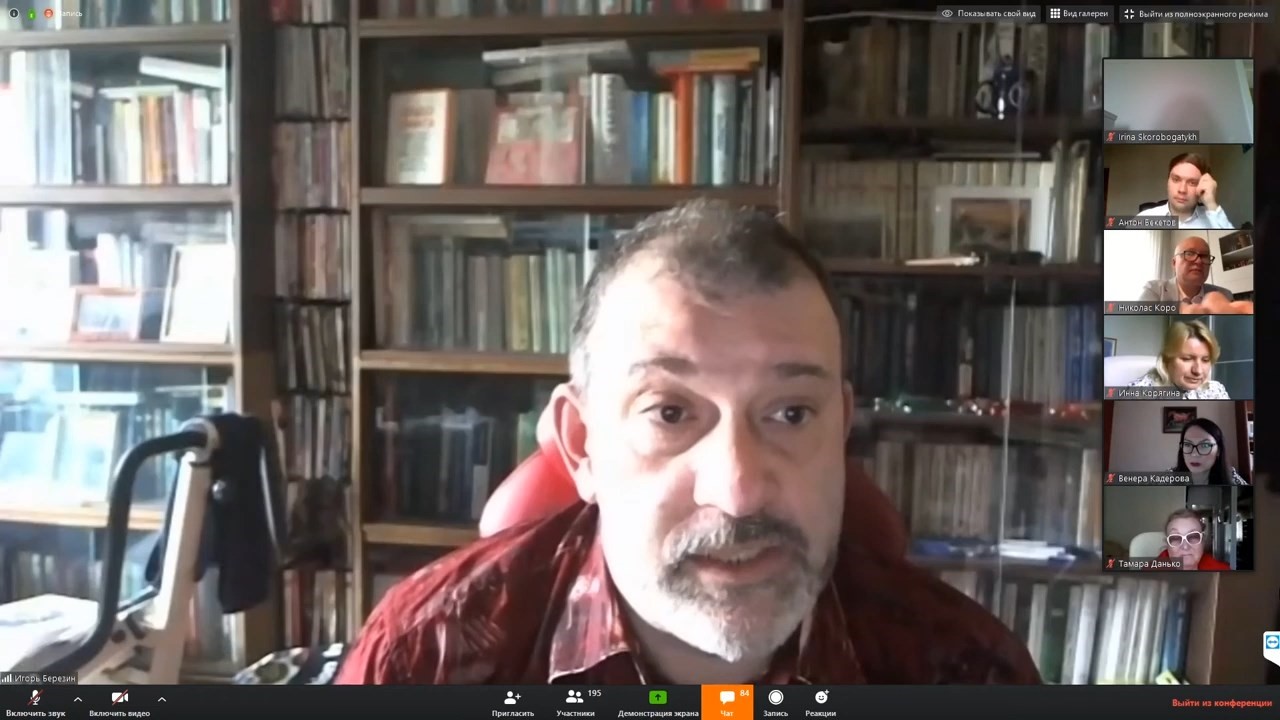 The round table, as well as other events of the Department of Marketing, was held with the support of the «Marketing Guild» and Igor Berezin, its President, in his speech made a brief but large and evidentiary overview not only of how the structure of purchases and behavior of consumers got changed, but also gave confidence to all of the participants that the crisis would provide an opportunity to modify marketing in many companies.
The round table, as well as other events of the Department of Marketing, was held with the support of the «Marketing Guild» and Igor Berezin, its President, in his speech made a brief but large and evidentiary overview not only of how the structure of purchases and behavior of consumers got changed, but also gave confidence to all of the participants that the crisis would provide an opportunity to modify marketing in many companies.
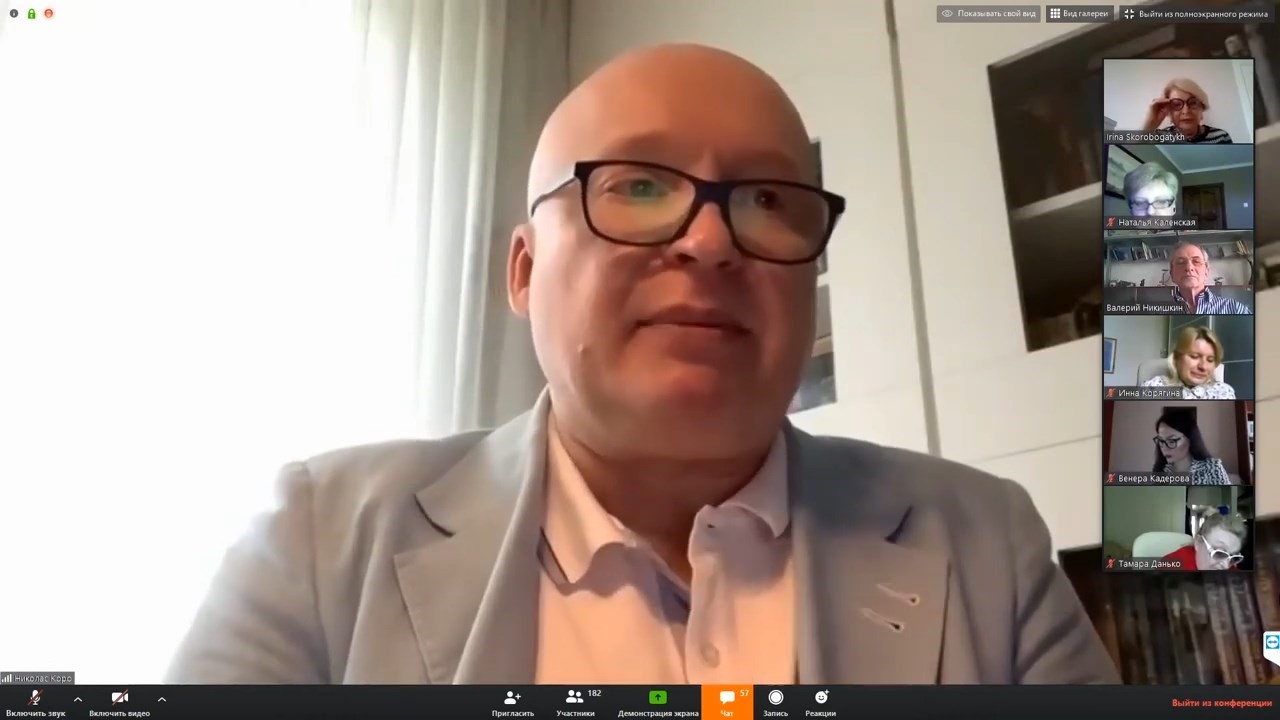 Nicholas Koro, a Member of the Board of the Marketing Guild and Chief Curator of the Brand Management Research Center and Brand Technology (RCB & B), made a report on what a relativistic marketing approach in response to the reversal of consumer behavior means during the period of self-isolation.
Nicholas Koro, a Member of the Board of the Marketing Guild and Chief Curator of the Brand Management Research Center and Brand Technology (RCB & B), made a report on what a relativistic marketing approach in response to the reversal of consumer behavior means during the period of self-isolation.
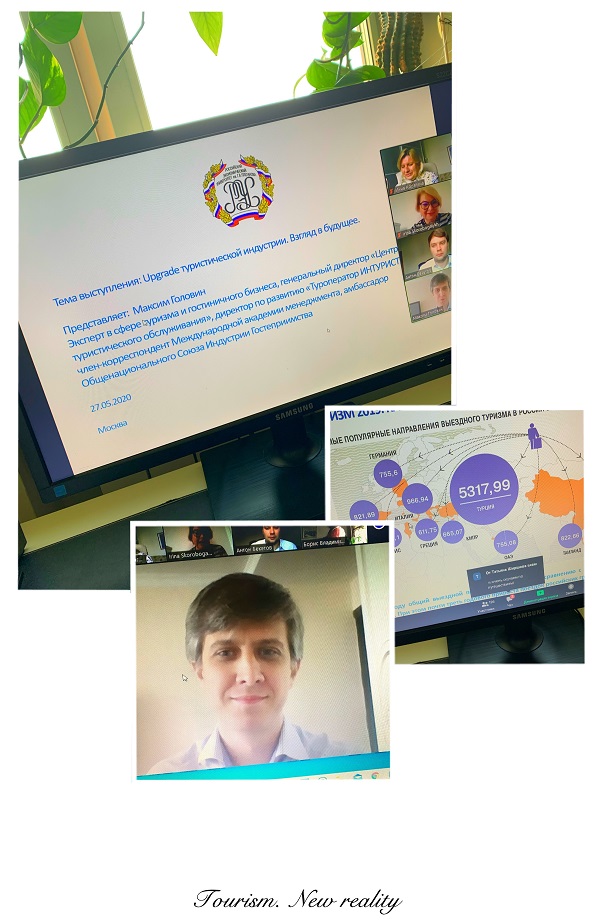 There was a very important report of Maxim Golovin, the Director of Development of Inturist Tour Operator LLC, who said that despite the fact that the tourism industry may suffer the most during the global outbreak period, we should not forget about consumer values with regard to the rest and travel activities and the reformation of the complex value of the tourism product to the changing conditions of the market and consumer requests.
There was a very important report of Maxim Golovin, the Director of Development of Inturist Tour Operator LLC, who said that despite the fact that the tourism industry may suffer the most during the global outbreak period, we should not forget about consumer values with regard to the rest and travel activities and the reformation of the complex value of the tourism product to the changing conditions of the market and consumer requests.
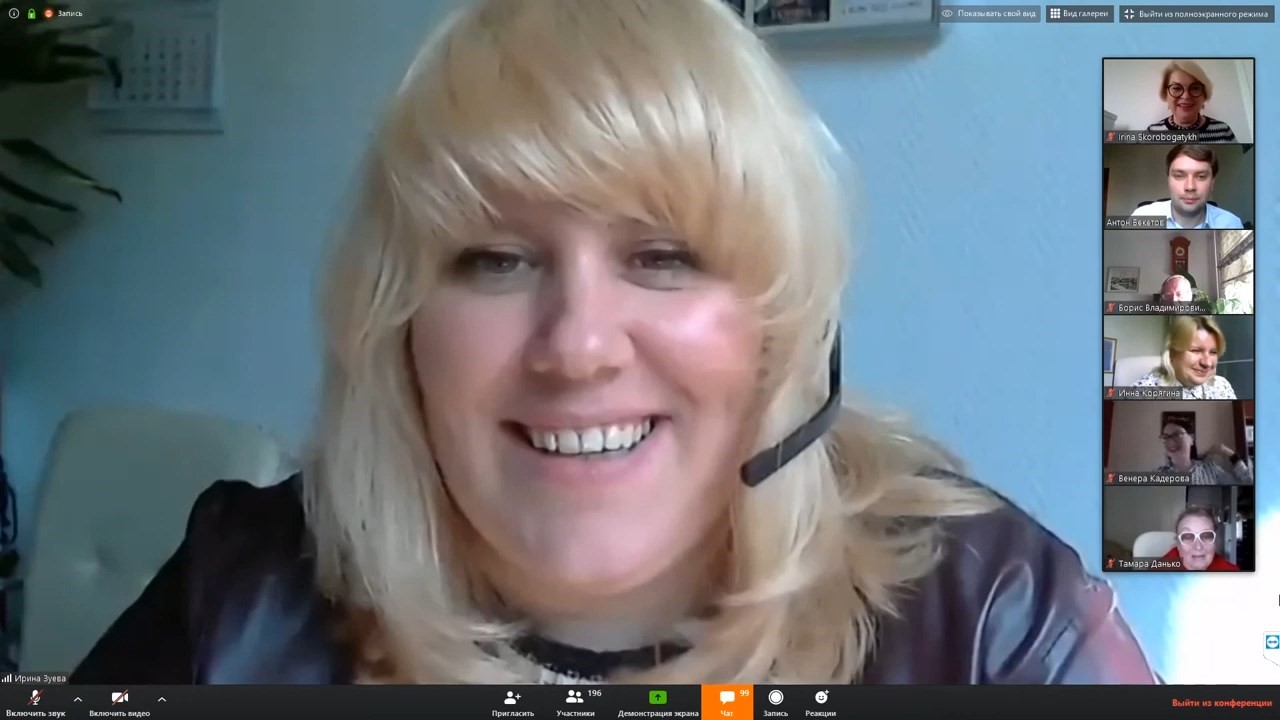 The talk of Irina Zueva, the marketing director of Ekonika network, who spoke about the marketing future in fashion retail, was extremely interesting. She pointed out that marketers during this period of the forced outbreak did not rest but worked on developing new, interesting and modern marketing interacting technologies with their consumers. Using examples of the most recent studies, Irina spoke on how consumer segments were changing and how they were becoming either "new economical" or "new squanderers" basing on their psychological factors and they did not intend to save on goods purchases for their own decoration.
The talk of Irina Zueva, the marketing director of Ekonika network, who spoke about the marketing future in fashion retail, was extremely interesting. She pointed out that marketers during this period of the forced outbreak did not rest but worked on developing new, interesting and modern marketing interacting technologies with their consumers. Using examples of the most recent studies, Irina spoke on how consumer segments were changing and how they were becoming either "new economical" or "new squanderers" basing on their psychological factors and they did not intend to save on goods purchases for their own decoration.
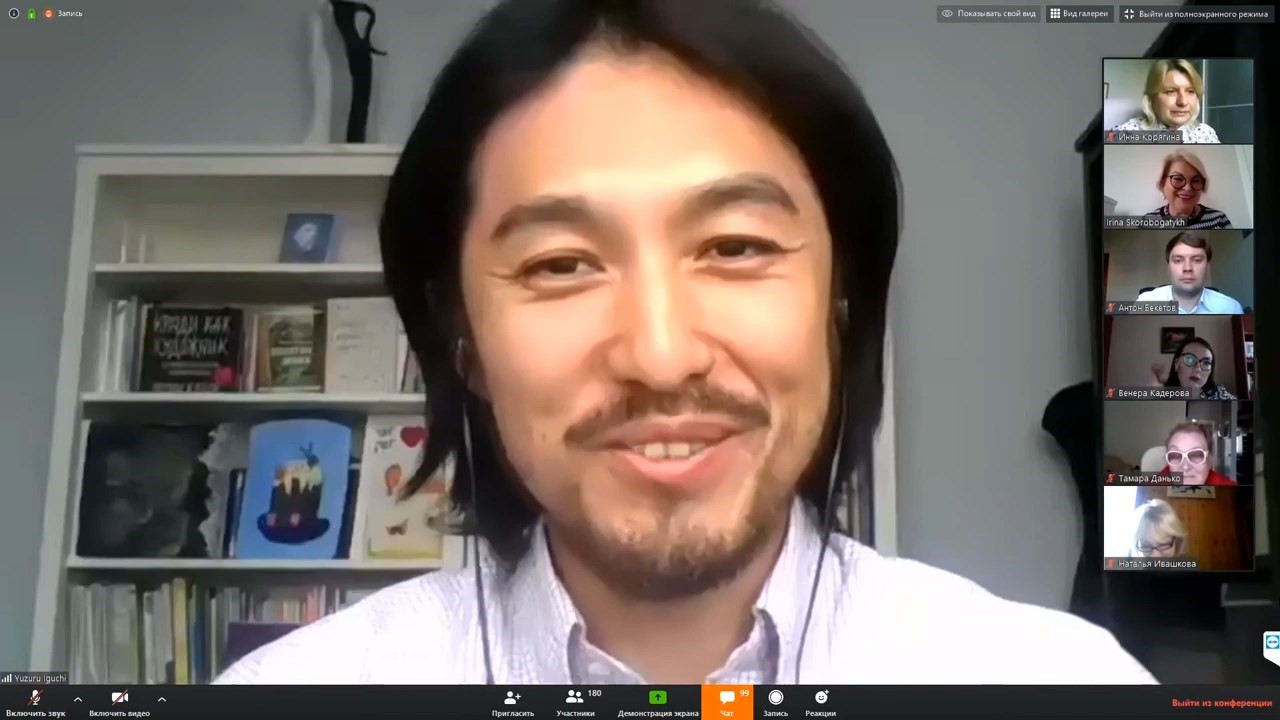 A very important, deep and scientifically justified was the speech of Mr. Yuzury Iguchi, the Director of Business Development of the oldest Japanese advertising agency «Hakudo» based in Moscow, on the reasons of consumers change. He notes that the origins of these changes lie far beyond the pandemic situation, that all the development of technology, digitalization of marketing, "internalization" of consumers led consumers to take greater care of their own safety (including cyber security) that consumer values are being reassessed and that is what can now become the basis for new marketing strategies to interact with consumers through new media channels that have already become familiar to them.
A very important, deep and scientifically justified was the speech of Mr. Yuzury Iguchi, the Director of Business Development of the oldest Japanese advertising agency «Hakudo» based in Moscow, on the reasons of consumers change. He notes that the origins of these changes lie far beyond the pandemic situation, that all the development of technology, digitalization of marketing, "internalization" of consumers led consumers to take greater care of their own safety (including cyber security) that consumer values are being reassessed and that is what can now become the basis for new marketing strategies to interact with consumers through new media channels that have already become familiar to them.
The most important question raised by both the Plekhanov Marketing Department and representatives of other marketing departments from other universities was how, due to the change in marketing activities of many companies, marketing competencies should change and what should they be like? How should this knowledge be transformed into marketing educational programs as a whole and marketing disciplines in particular? A smart mix of hard skills (big data analytics, customer experience, perception and consumer confidence) and soft skills (creativity, messaging, group dynamics and teamwork) are the answers to shaping the marketing programs that today 's professionals are in need after the Global Outbreak due to Covid-19 pandemic.
The presentations (PPTX) and videos are available on the website of Plekhanov Marketing Department:
https://plekhanov.marketing/roundtable2020